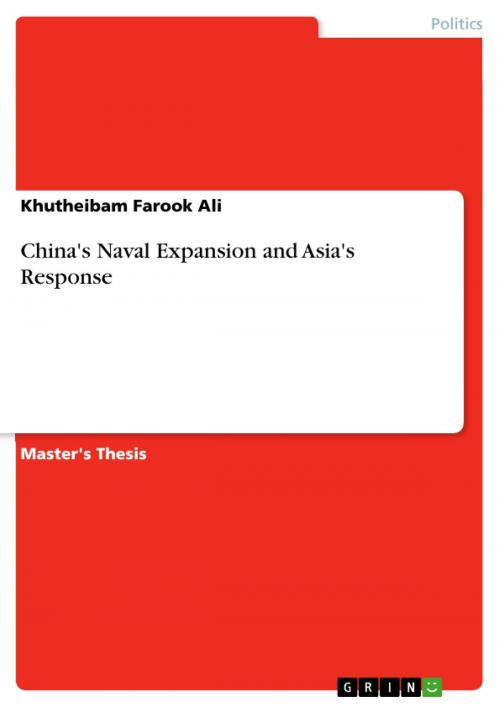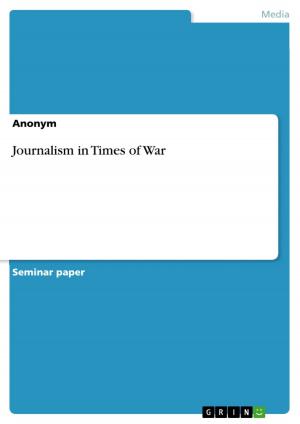China's Naval Expansion and Asia's Response
Nonfiction, Social & Cultural Studies, Political Science, International, International Relations| Author: | Khutheibam Farook Ali | ISBN: | 9783668165427 |
| Publisher: | GRIN Publishing | Publication: | March 3, 2016 |
| Imprint: | GRIN Publishing | Language: | English |
| Author: | Khutheibam Farook Ali |
| ISBN: | 9783668165427 |
| Publisher: | GRIN Publishing |
| Publication: | March 3, 2016 |
| Imprint: | GRIN Publishing |
| Language: | English |
Master's Thesis from the year 2014 in the subject Politics - International Politics - Region: Far East, grade: A, Jawaharlal Nehru University (School Of International Studies), language: English, abstract: The Dissertation aims at identifying the variable that explains the variation in the responses of the Asian states to the China's naval modernisation and expansion. Moreover, the work will also look into the factors that drive China's naval modernisation and expansion. The study aims at contributing to the existing literature the variable that explain the variations in the responses and motivations behind China's aggressive seaward turn as China is a land oriented power. A few selected Asian states are in examination. Two small states, South Korea and Taiwan, and two big powers, Japan and India, are taken as case studies to examine the variation in the response. There are vast literatures available on the quantitative aspect of China's modernisation and expansion, and the response to it, but there is lack on the qualitative aspect of the modernisation program and the responses. The Research Questions What factors drive China's naval modernisation and expansion? What are the security implications of China's naval modernisation and expansion for the security of Asian region? How is the region balancing this potential assertiveness and subsequent security threat? Why Japan, Taiwan, and South Korea reacted so differently considering the similar contexts and same disputed waters? How India reacted to the China aggressive moves in the Indian Ocean? Is there a region wide trend in how Asian states respond to the PLA Navy's modernisation and expansion drive? These questions are very crucial for policy and decision-makers alike and the central purpose of this dissertation is to research a comprehensive study of the regional foreign policy to answer these questions. The Hypotheses Domestic as well as international constraints drive China's naval modernisation and expansion. As China's naval expands, a region wide trend of increasing threat perception is observable among the Asian nations. As China's naval expansion and its policy becomes assertive atleast in ECS and SCS, a clear balancing behaviour among the Asian nations is observable. This involves internal balancing in increasing its own naval capabilities as well as external balancing in increasing ties with the U.S. This dissertation proposes that varied responses by the Asian states to the PLA Navy's modernisation and expansion are a reflection of historic memory of war and conflict, and economic dependence rather than only threat and capabilities.
Khutheibam Farook Ali is a Senior Research Fellow (SRF) at the Centre for International Politics, Organization and Disarmament (CIPOD), Jawaharlal Nehru University, New Delhi, India. He can be contacted at khutheibamfarook(at)gmail(dot)com
Master's Thesis from the year 2014 in the subject Politics - International Politics - Region: Far East, grade: A, Jawaharlal Nehru University (School Of International Studies), language: English, abstract: The Dissertation aims at identifying the variable that explains the variation in the responses of the Asian states to the China's naval modernisation and expansion. Moreover, the work will also look into the factors that drive China's naval modernisation and expansion. The study aims at contributing to the existing literature the variable that explain the variations in the responses and motivations behind China's aggressive seaward turn as China is a land oriented power. A few selected Asian states are in examination. Two small states, South Korea and Taiwan, and two big powers, Japan and India, are taken as case studies to examine the variation in the response. There are vast literatures available on the quantitative aspect of China's modernisation and expansion, and the response to it, but there is lack on the qualitative aspect of the modernisation program and the responses. The Research Questions What factors drive China's naval modernisation and expansion? What are the security implications of China's naval modernisation and expansion for the security of Asian region? How is the region balancing this potential assertiveness and subsequent security threat? Why Japan, Taiwan, and South Korea reacted so differently considering the similar contexts and same disputed waters? How India reacted to the China aggressive moves in the Indian Ocean? Is there a region wide trend in how Asian states respond to the PLA Navy's modernisation and expansion drive? These questions are very crucial for policy and decision-makers alike and the central purpose of this dissertation is to research a comprehensive study of the regional foreign policy to answer these questions. The Hypotheses Domestic as well as international constraints drive China's naval modernisation and expansion. As China's naval expands, a region wide trend of increasing threat perception is observable among the Asian nations. As China's naval expansion and its policy becomes assertive atleast in ECS and SCS, a clear balancing behaviour among the Asian nations is observable. This involves internal balancing in increasing its own naval capabilities as well as external balancing in increasing ties with the U.S. This dissertation proposes that varied responses by the Asian states to the PLA Navy's modernisation and expansion are a reflection of historic memory of war and conflict, and economic dependence rather than only threat and capabilities.
Khutheibam Farook Ali is a Senior Research Fellow (SRF) at the Centre for International Politics, Organization and Disarmament (CIPOD), Jawaharlal Nehru University, New Delhi, India. He can be contacted at khutheibamfarook(at)gmail(dot)com















